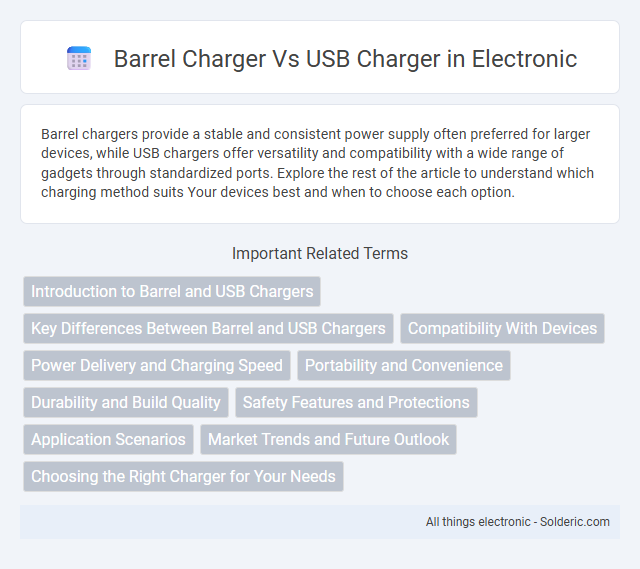Barrel chargers provide a stable and consistent power supply often preferred for larger devices, while USB chargers offer versatility and compatibility with a wide range of gadgets through standardized ports. Explore the rest of the article to understand which charging method suits Your devices best and when to choose each option.
Comparison Table
| Feature | Barrel Charger | USB Charger |
|---|---|---|
| Connector Type | Cylindrical barrel plug | USB-A, USB-C, Micro-USB |
| Voltage Range | Typically 5V to 24V | Usually 5V, up to 20V with USB Power Delivery |
| Current Capacity | Up to 5A depending on size | Varies from 0.5A to 5A (USB PD) |
| Compatibility | Specific to device model | Universal for USB-powered devices |
| Popularity | Common in laptops, routers | Common in smartphones, tablets, accessories |
| Ease of Use | Simple plug-in but less versatile | Standardized, reversible (USB-C) |
| Charging Speed | Dependent on power adapter specs | Fast charging with USB PD support |
| Durability | Less durable connectors | More durable, especially USB-C |
| Cost | Generally lower cost | Varies, often higher due to technology |
Introduction to Barrel and USB Chargers
Barrel chargers feature cylindrical connectors primarily used in power adapters for laptops and electronic devices, offering stable and high-voltage power delivery. USB chargers utilize a universal interface with various standards such as USB-A, USB-C, and USB-PD, enabling versatile charging for smartphones, tablets, and other portable electronics. USB charging supports data transfer and fast charging protocols, while barrel chargers provide dedicated power without data connectivity.
Key Differences Between Barrel and USB Chargers
Barrel chargers typically deliver higher voltage and amperage, making them suitable for larger electronic devices like laptops and power tools, whereas USB chargers are standardized for lower power output mainly used for smartphones, tablets, and small gadgets. The barrel charger uses a cylindrical connector, offering a secure, dedicated fit, while USB chargers employ universal connectors like USB-A, USB-C, or Micro-USB, enhancing compatibility across numerous devices. In terms of charging speed and data transfer, USB chargers, especially USB-C with Power Delivery protocols, provide faster and more versatile charging compared to most barrel chargers.
Compatibility With Devices
Barrel chargers typically provide a fixed voltage and connector size, ensuring reliable power delivery for specific devices like laptops or routers with matching ports. USB chargers offer broader compatibility, supporting a wide range of gadgets including smartphones, tablets, and some laptops through standardized USB-A, USB-C, or Lightning connectors. Your choice depends on the device's charging port and power requirements, making USB chargers more versatile across multiple devices.
Power Delivery and Charging Speed
Barrel chargers typically deliver consistent voltage and current designed for specific devices, but often lack the advanced power delivery protocols found in USB chargers. USB chargers, especially those supporting USB Power Delivery (USB-PD), dynamically adjust voltage and current to optimize charging speed and efficiency for compatible devices. Your device can charge faster and safer with USB chargers due to intelligent power negotiation and higher wattage capabilities compared to traditional barrel chargers.
Portability and Convenience
Barrel chargers are typically bulkier and less convenient for travel due to their fixed cables and larger size, limiting portability compared to USB chargers. USB chargers offer greater portability with compact designs and interchangeable cables, making them ideal for on-the-go use across various devices. Their widespread compatibility with smartphones, tablets, and laptops enhances convenience in diverse charging scenarios.
Durability and Build Quality
Barrel chargers typically feature robust connectors and thicker cables, enhancing durability and resistance to wear, making them ideal for frequent use or harsh environments. USB chargers often prioritize compactness and convenience, but their fragile connectors and thinner cables may compromise long-term build quality. Choosing a barrel charger can improve your device's charging reliability and extend the lifespan of the charging equipment.
Safety Features and Protections
Barrel chargers typically include built-in overcurrent, overvoltage, and short-circuit protection to ensure safe charging for specific devices, reducing the risk of damage. USB chargers incorporate advanced safety features such as temperature control, surge protection, and automatic current adjustment to protect both the charger and your device. Choosing the right charger with appropriate safety mechanisms ensures reliable power delivery and prevents potential harm to your electronics.
Application Scenarios
Barrel chargers are preferred in industrial equipment and larger electronic devices due to their ability to deliver higher power levels with stable voltage output, making them ideal for drones, medical devices, and robotics. USB chargers dominate consumer electronics such as smartphones, tablets, and laptops because of their universal compatibility, widespread availability, and ability to support data transfer alongside charging. The choice between barrel and USB chargers depends largely on the device's power requirements and application context, with barrel chargers suited for heavy-duty applications and USB chargers for portable, low to medium power gadgets.
Market Trends and Future Outlook
The barrel charger market is experiencing declining demand due to the rise of versatile USB chargers, which support faster charging speeds and universal compatibility across devices like smartphones, laptops, and tablets. Market trends indicate a growing preference for USB Type-C chargers driven by increasing adoption in consumer electronics and automotive industries, emphasizing efficiency and sustainability. Future outlooks predict continued innovation in USB charging technology, including wireless and fast-charging solutions, while barrel chargers will remain niche, primarily in legacy equipment and specialized industrial applications.
Choosing the Right Charger for Your Needs
Barrel chargers typically deliver higher, more stable power outputs suited for larger devices like laptops and certain cameras, while USB chargers offer versatile compatibility with smartphones, tablets, and smaller electronics. Your choice hinges on the voltage and current requirements specified by your device, ensuring safe and efficient charging without damage. Evaluating connector types, power ratings, and portability will help you select the charger that best meets your device's energy demands and usage scenarios.
Barrel charger vs USB charger Infographic

 solderic.com
solderic.com